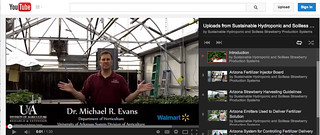Arkansas strawberry growers getting online guide to hydroponic production
ON SCREEN -- Dr. Mike Evans welcomes viewers in the introduction to a series of videos on growing strawberries hydroponically or without soil. (U of Arkansas System Division of Agriculture image)
Fast facts
- Project uses YouTube as educational tool
- View video series at www.youtube.com/user/sustainablehydro/.
(460 words)
FAYETTEVILLE, Ark. –Strawberry growers in Arkansas will soon have an online, step-by-step guide to tell them everything they need to know to grow berries year round, without soil.
A professor with the University of Arkansas Division System of Agriculture is putting the finishing touches on a YouTube channel with a series of how-to videos on soilless and hydroponic winter strawberry production, in greenhouses.
“The objective is to walk growers through all the facets of the project,” said Michael Evans, a horticulture professor who is leading the project. “Theoretically, a grower can go to the YouTube channel and learn how do put everything together.”
Evans said the project is designed to be a demonstration project to educate growers, rather than a research project, although he expects it to generate some useful research information. The program is being funded from part of a $3 million grant made to the Division of Agriculture last year by the Walmart Foundation.
The videos were filmed at a hydroponic production facility in Fayetteville, as well as sites in Belgium and the University of Arizona, Evans said. They are being edited and will be uploaded to the YouTube channel, which will be located at: www.youtube.com/user/sustainablehydro/.
Once the site is live, the team will be able to monitor how many growers view the videos and see their comments about the program.
Strawberries are the fifth most popular fresh fruit product in the United States, with about 3 billion pounds grown in 2012 -- a crop worth more than $2.4 billion, according to the U.S. Department of Agriculture. California and Florida account for 98 percent of the nation’s strawberry production, with smaller crops in a number of other states, including Arkansas.
Because strawberries are delicate and highly perishable, more than a third of the berries are lost before they can reach consumers, which has left growers and researchers searching for ways to widen the areas of production beyond California and Florida.
“Certainly, that’s one of the advantages, to produce closer to market,” Evans said.
The Division of Agriculture is overseeing the National Strawberry Sustainability Initiative, a grant program to fund projects to increase local and regional production of strawberries, as well as reducing the environmental impact of production.
So far, the initiative has awarded $2.64 million in grants for projects in Arkansas and 12 other states, funded by the Walmart Foundation grant.
Evans said the lessons learned from the strawberry program might also prove useful in growing other crops in Arkansas, such as leafy greens and herbs, with hydroponic methods. He said soilless food production is a rapidly growing segment of agriculture, with total production now topping $3 billion, about the size of the U.S. apple crop.
Pursuant to 7 CFR § 15.3, the University of Arkansas System Division of Agriculture offers all its Extension and Research programs and services (including employment) without regard to race, color, sex, national origin, religion, age, disability, marital or veteran status, genetic information, sexual preference, pregnancy or any other legally protected status, and is an equal opportunity institution.
By Rich Shumate
For the U of Arkansas System Division of Agriculture
Media Contact: Mary Hightower
Dir. of Communication Services
U of A Division of Agriculture
Cooperative Extension Service
(501) 671-2126
mhightower@uada.edu
Related Links
